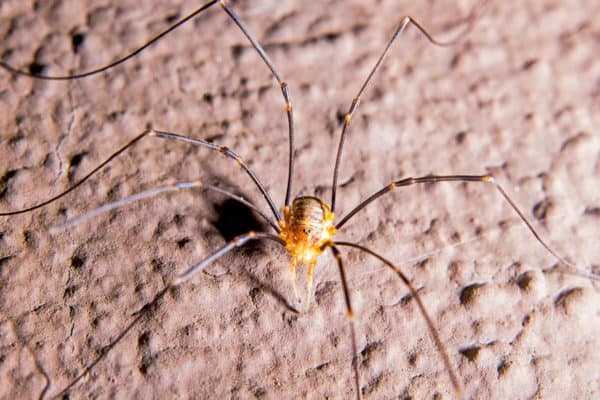READY TO GET STARTED?
REQUEST A FREE ESTIMATE
Fill out the form below or call (888) 466-7849 for a free, no-obligation estimate.

The granddaddy long legs is legendary – with claims of being the “most poisonous spider in the world but their mouths are too small to bite.” Like most legends, these claims are exaggerated and aren’t based on facts. So what is the truth about these creatures? Here’s everything you need to know about the granddaddy long legs.
No. The granddaddy long legs, AKA the daddy long legs, harvest spider, and harvestman, is actually an arthropod and closer genetically to the scorpion than a spider. While they do have 8 legs like spiders, the resemblance ends there. Spiders have spinnerets that spin silk for their webs; granddaddy long legs don’t. Spiders also have 2 body sections connected by a small, narrow waist. Granddaddy long legs have 1 body section containing their head, abdomen, and body combined. Spiders can have fangs and produce venom. Granddaddy long legs don’t have fangs and don’t produce venom. Spiders live on a liquid diet while granddaddy long legs have chelicerae (tiny claws used to hold and tear things) so they can eat small pieces of solid food. Granddaddy long legs can also self amputate their legs as a defense mechanism against predators. Unfortunately, once they lose a leg they cannot grow it back.
Granddaddy long legs are omnivores and eat a wide variety of things. They are known to eat dead and live insects, spiders, aphids, worms, snails, fungus, and even bird droppings.
Granddaddy long legs use their varied diets to keep to keep your gardens and yard free of other pests. They don’t cause damage to structures or landscaping and aren’t dangerous to humans.
Because they aren’t harmful to humans and don’t damage any structures or landscaping in your yard or garden, it is best to leave granddaddy long legs alone. Sometimes they are known to congregate in large numbers. If this is the case or if you have an issue with these or other pests, contact your local pest control company who can thoroughly evaluate your home and provide you with the appropriate treatment and prevention plan for your situation.
Prep Your Yard & Keep Mosquito Free!
What Attracts Millipedes to Your Home?
Signs You’ve Got a Rat in the House